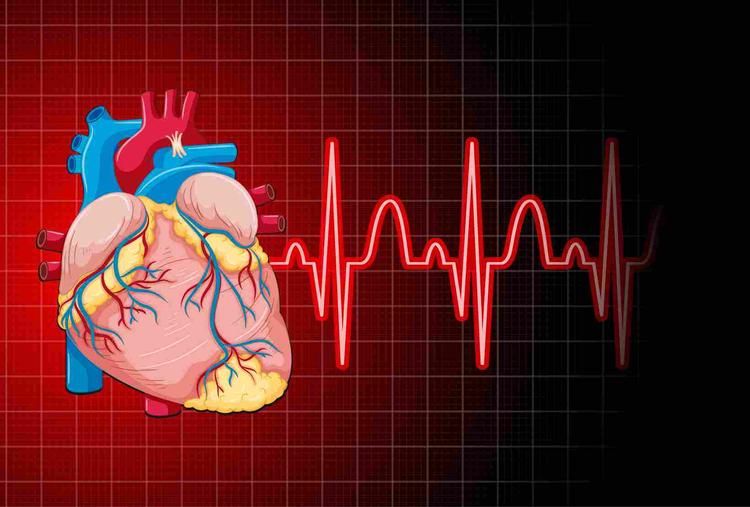TMT Test for Heart: Why is the Checkup Done, Normal Range

Medically Reviewed By
Dr. Ragiinii Sharma
Written By Srujana Mohanty
on Mar 14, 2022
Last Edit Made By Srujana Mohanty
on Apr 1, 2024

The treadmill ECG stress test (TMT) is part of health check packages recommended for asymptomatic people to detect diseases at an early age that can prevent or reduce future morbidity and mortality. The TMT test has an average sensitivity of 68% and a specificity of 77%. In this article, learn about the TMT test for the heart, why it is done, and the normal range of TMT for people.

Heart-related complications are often life threatening, if not fatal. Rapid heart rate, shortness of breath, discomfort and pain in the chest – all of these are common signs of cardiovascular complications that you are likely taking for granted. Routine and complete screening allows you to live a carefree life without the burden of worries in your head. Get routine tests to stay updated about your heart function.
In this Article
What is the need for the TMT Test for Heart?
The TMT test helps diagnose heart conditions and see how well your heart handles the workload. Your doctor might suggest you a TMT test if you are undergoing heart surgery, heart treatment, or starting some vigorous exercise program. Other reasons for which a doctor might recommend a TMT test are-
- Diagnosis of the damage or disease in the coronary arteries due to the accumulation of cholesterol or other substances (plaques).
- Diagnosis of cardiac arrhythmia that can occur due to improper coordination of the electrical impulses.
- Plan the treatment of heart disorders
- Diagnose cardiovascular health
You might also be recommended a TMT test if you have one or more of the following symptoms that indicate a heart disease:
- Fast heartbeat
- Irregular heartbeat
- Dizziness
- Chest pain
- Breathing difficulty
What is the normal range of TMT?
During a TMT test, you will be asked to exercise at approximately 85% of your maximum heart rate. The maximum heart rate is calculated by subtracting your age from 220. The TMT test can be either negative or positive. A negative TMT test indicates that the patient could reach a certain heart rate without showing any changes in the ECG result. Whereas a positive TMT result indicates that there were changes in the ECG report were obtained post-workload.
Doctors also evaluate how well your heart rate recovers post-exercise. The recovery is calculated by subtracting the heart rate one minute after exercise from the peak heart rate. The inferences drawn are tabulated below:
| S.No. | Peak heart rate minus the heart rate 1 minute after intense exercise | Inference |
| 1. | < 12 bpm in a walking recovery | Abnormal |
| 2. | > 12 bpm in a walking recovery | Normal |
| 3. | < 18 bpm while lying on the back | abnormal |
| 4. | > 18 bpm while lying on the back | Normal |
During a TMT test, your blood pressure is also monitored. The changes in the diastolic and systolic blood pressure can be an indication of certain health conditions. The major inferences that can be drawn from blood pressure readings are
| S.No. | Blood pressure readings | Inference |
| 1. | Less than 10 mm Hg increase in the blood pressure | This might be due to the blood pressure reduction medications |
| 2. | Less than 10 mm Hg change in the diastolic blood pressure | Peripheral vasodilation |
| 3. | Drop in the systolic blood pressure of more than 10 mm Hg | Severe left ventricle dysfunction or coronary artery disease |
| 4. | Systolic blood pressure greater than 250 mm Hg and diastolic blood pressure greater than 120 mm Hg | Severe hypertension |
Your tolerance to exercise can also be calculated through the TMT test. These values are calculated in terms of metabolic equivalents or METS. METS refers to the uptake of oxygen expressed in kg/minute. The inferences that can be drawn from the TMT test are listed below:
| S.No. | METS Reading | Inference |
| 1. | < 5 METS | Poor |
| 2. | 5 - 8 METS | Fair |
| 3. | 9 - 11 METS | Good |
| 4. | > 12 METS | Any METS score above 10 indicates a 5-year survival rate of around 95%. |
Takeaway
The TMT or treadmill stress test is a safe, non-invasive and affordable screening test for the diagnosis of coronary artery diseases (CAD). It is an essential diagnostic test for people at a higher risk of developing cardiovascular diseases. Now that you know what a TMT test is, who are the best candidate for the test and what the values of the test report mean, you will be able to analyze your health status better.
Frequently Asked Questions (FAQs)
-
Who should not go for a TMT test?
The TMT test is not suggested for people who have any heart or cardiovascular conditions, arthritis, or had a stroke or heart attack in the recent past.
-
What are the risks of getting a TMT test done?
Generally, a TMT test is safe. However, some of the rare risks of the TMT test include collapse, chest pain, heart attack, getting fainted, or irregular heartbeat.
-
What is the normal TMT report?
The normal maximum TMT heart rate for adults is 220 minus your age. 85% of this predicted maximum heart rate is considered normal.
Leave a comment
7 Comments
Jyoti khurana
Apr 14, 2024 at 5:17 PM.
I m 47 years old. I am asthmatic. During tmt test I exercised BRUCE for 7.25 minutes achieving work level 10.10 Mets. Maximum heart rate 164 BPM, maximum blood pressure 140/80. The doctor said that the test is borderline positive for inducible ischemia. Do I need any medication
MyHealth Team
Apr 15, 2024 at 1:02 PM.
Hi Jyoti, Given your borderline positive TMT result and medical history, follow up with your doctor for further evaluation and potential medication.
GOVARADHAN GOPAL
Apr 1, 2024 at 8:42 AM.
Cardiac stress analysis is POSITIVE for inducible myocardial ischaemia at good work load and 98% of maximum heart. What it means?
Myhealth Team
Apr 1, 2024 at 10:01 AM.
Hi Gopal,
A positive result for inducible myocardial ischemia on a cardiac stress analysis suggests that there is evidence of inadequate blood flow to the heart during physical exertion. This can indicate potential blockages or narrowing in the coronary arteries, which supply blood to the heart muscle.
The fact that it occurred at a good workload and 98% of maximum heart rate indicates that the heart is not receiving sufficient blood flow even during periods of increased demand, such as during exercise when the heart needs more oxygen-rich blood.
This finding warrants further evaluation by a cardiologist to determine the severity of the condition and to develop an appropriate treatment plan, which may include lifestyle changes, medication, or procedures to improve blood flow to the heart. It's important to follow up with your healthcare provider for personalized guidance and management.
Thankyou
Ravi shankar
Jan 27, 2024 at 6:06 AM.
Sir i have pain in my left chest area. My ecg report says a HR of 102 bpm. My echo lvef is 60 -3%... Echo says i have a mild TR.. Doctor suggested do do a TMT test.. My pain is not relieving... What should i do
Myhealth Team
Apr 1, 2024 at 10:02 AM.
Hi ravi, If you're experiencing persistent chest pain, follow your doctor's advice for the TMT test. Since the pain is not relieving and you're concerned, seek immediate medical attention. Always prioritize your health and follow your doctor's guidance closely. Thankyou
Myhealth Team
Jan 30, 2024 at 12:40 PM.
With persistent chest pain and abnormal ECG findings, it's crucial to follow your doctor's advice and undergo the TMT test for further evaluation of heart function and potential coronary artery disease. If pain persists or worsens, seek immediate medical attention.
Sunil Kumar
Oct 10, 2023 at 5:25 PM.
My Echo result is LVEF 60% My TMT readings is followings Stage Grade METS HR 1. 10% 4.6. 116 2. 12% 7.0. 127 3. 14% 10.2. 142 4. 16% 13.5. 155 5. 18% 17.2. 161 Max HR 163 Max METS 17.2 Max VO2 60.2 Total time 12.33 min My age 37 yr Please confirm. Is this good for me or not.
Myhealth Team
Apr 1, 2024 at 10:03 AM.
Hi Sunil, Based on your age and the TMT results, achieving a maximum METs value of 17.2 and a maximum heart rate of 163 is considered excellent. Your exercise capacity and cardiovascular fitness level appear good. Thankyou
Myhealth Team
Oct 13, 2023 at 11:18 AM.
Your LVEF is good at 60%, and the TMT results suggest good exercise capacity. Consult your doctor for a comprehensive evaluation.
ibrahim
Oct 2, 2023 at 5:07 AM.
My TMT results: Total time 9.04 minutes (Peak EX Stage 4 for 5 seconds). Peak heart rate 144 (BRUCE Stage 3) THR 84% peak MET 10.3 (Peak EX) Peak BP was 160/90 (during the recovery at 11th minute)
Myhealth Team
Oct 7, 2023 at 9:20 AM.
Your TMT results indicate good exercise capacity, reaching a peak MET of 10.3. However, the peak blood pressure reading of 160/90 mm Hg during recovery may warrant discussion with your healthcare provider for further evaluation and guidance.
Rajendra Ithape
Jan 29, 2023 at 2:39 PM.
My age 51 yrs. My max heart rate is 167 at tmt. Is it normal?
Myhealth Team
Feb 2, 2023 at 11:09 AM.
Hello Sir, Your heart rate is too high. You shall see a cardiologist.
Muhammed hakkim Khan
Nov 19, 2022 at 4:30 PM.
Sir. I have my left side chest pain continusily for last 2 years and I have done all my test ( ecg, echo, tmt) all test are normal but I have the pain constantly the pain is only left side, I have cervical spondylitis I met many doctors When I visit doctors fir chest pain they will take ecg then given some medicine for pain killer and tell to go for physiotherapy that also done but still I have pain I can't consantrte my day to day activities because of this sir Pls suggest My echo and tmt done last week still I have heart problam??
Myhealth Team
Nov 21, 2022 at 12:53 PM.
Thanks for the enquiry. Having a pain, heaviness or discomfort in your chest can be scary. It does not always mean that you are having a heart attack. There can be many other causes, including angina, Panic attacks, Digestive problems, such as heartburn or esophagus disorders Sore muscles,Lung diseases,such as pneumonia, pleurisy, or pulmonary embolism Costochondritis. Some of these problems can be serious. Get immediate medical care if you have chest pain that does not go away, crushing pain or pressure in the chest, or chest pain along with nausea, sweating, dizziness or shortness of breath. Treatment depends on the cause of the pain.



